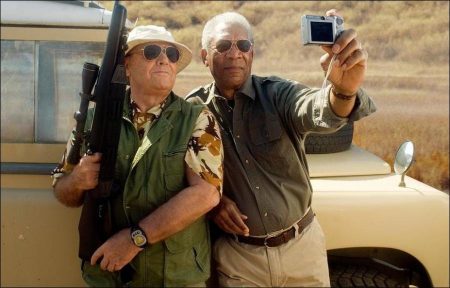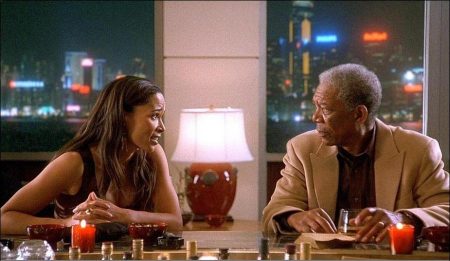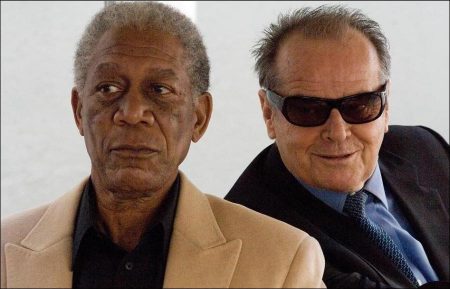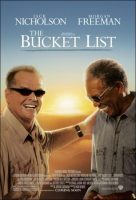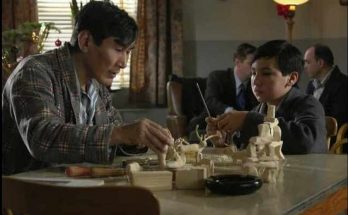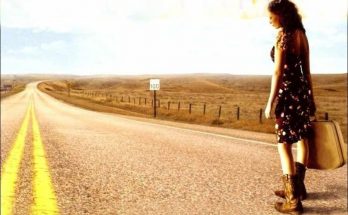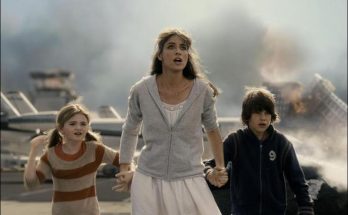Taglines: You only live once, so why not die with style?
The Bucket List movie storyline. A long time ago, Carter Chambers’ (Morgan Freeman) freshman year philosophy professor suggested that his students compose a “bucket list,” a collection of all the things they wanted to do, see and experience in life before they kicked the bucket. But while Carter was still trying to define his private dreams and plans, reality intruded.
Marriage, children, myriad responsibilities and, ultimately, a 46-year job as an auto mechanic gradually turned his concept of a bucket list into little more than a bittersweet memory of lost opportunities and a mental exercise he occasionally thought about to pass the time while working under the hood of a car.
Meanwhile, corporate billionaire Edward Cole (Jack Nicholson) never saw a list without a bottom line. He was always too busy making money and building an empire to think about what his deeper needs might be beyond the next big acquisition or cup of gourmet coffee. Then life delivered an urgent and unexpected wake-up call to both of them. Carter and Edward found themselves sharing a hospital room with plenty of time to think about what might happen next—and about how much of that was in their hands. For all their apparent differences, they soon discovered they had two very important things in common: an unrealized need to come to terms with who they were and the choices they’d made, and a pressing desire to spend the time they had left doing everything they ever wanted to do.
The list wasn’t just a mental exercise anymore. It was an agenda. So, against doctor’s orders and all good sense, these two virtual strangers check themselves out of the hospital and hit the road together for the adventure of a lifetime— from the Taj Mahal to the Serengeti, the finest restaurants to the seediest tattoo parlors, the cockpit of vintage race cars to the open door of a prop plane—with just a sheet of paper and their passion for life to guide them.
About the Production
Director/producer Rob Reiner was only 10 pages into the script of “The Bucket List” when he told producing partner Alan Greisman he had found their next project. As Greisman recalls, “I told him to read the rest of it, just to be sure, but there was no doubt about it. This was a subject close to his heart and without having to read any further, he knew. ‘I love this story; I know these characters,’ he said. ‘This is it.’”
The two then contacted producers Craig Zadan and Neil Meron of Storyline Entertainment, who had sent them the script, and started making plans that would launch “The Bucket List” into production within the year.
Reiner responded to the story in an immediate, deeply personal way and felt it addressed issues that many people can relate to. “The baby boom generation, in particular, are really starting to examine and evaluate their lives in a deeper way and the themes touched on by ‘The Bucket List’ really resonate. Those of us who have parents or grandparents getting up in years can appreciate what it’s like to look back on the time spent and also to look ahead and really think about what we’re doing with the time we’ve been given. I knew this was a subject I absolutely wanted to tackle now.
“There was just something about it,” he adds, citing the story’s potential for natural humor as well as intimately personal human situations, not to mention “the grand adventure that takes these two men around the world to figure out what’s been burning inside them their entire lives.”
Zadan and Meron weren’t surprised, having fallen in love with the story themselves after “The Bucket List” caught the attention of their head of feature development, Travis Knox, an executive producer on the film.
“It was just like any other weeknight when I took home a pile of scripts to read, but this was the first one in a long time that I could not put down. It was special, a unique blend of humor and heart. I had to be a part of it,” Knox says, recounting how he then took it to Zadan and Meron and suggested Reiner, with whom the producers had recently met on an entirely different matter and had struck an undeniable creative rapport.
Acknowledging Reiner’s impressive body of work, Zadan recalls, “What we liked about Rob was his ability to find the humor in emotional subjects. It’s that depth that gives him such impact as a director and exactly what we all wanted for ‘The Bucket List.’”
Says Greisman, “This is a story about friendship and love and discovering what’s really important in life. It stirs a lot of emotions but at the same time makes you laugh and, ultimately, I think, says something significant about the human condition.” Moreover it reminds us, as Jack Nicholson affirms, “It’s always the things you don’t do in life that you regret most, not the things you do.”
The developing—and often combustible—rapport between these two unlikely traveling companions is what propels the story. Although poles apart in background, temperament, experience and in innumerable other ways, what they share more than makes up for these superficial differences.
Morgan Freeman, who stars as Carter, suggests, “You bond to people with whom you have something in common and these two have something very important in common. They are holding the rest of their lives in their hands and they both know it. When Carter meets Edward, he is offered an opportunity to do things differently for the first time, to go his own way. For a man who feels he’s spent his life doing what’s best for everyone else, that’s very powerful.”
The list itself, from one of the college classes Carter attended before giving up his studies to support his family, “was an exercise in forward-thinking. It was meant to give young people focus by making them think about what was really important to them and what they wanted to achieve in life,” Reiner explains. It’s a concept that the naturally introspective Carter has often returned to and refined, idly, and he toys with it again as he rests in the hospital contemplating his options. Even if Carter had ever entertained the possibility of pursuing his bucket list items, he certainly doesn’t expect to do it now, and says so when Edward happens to see the list and asks about it.
But Edward, unfamiliar with the concept of “no” and “too late,” proposes that they do exactly that. Immediately. He even adds his own items, in his own characteristic fashion.
Freeman notes how much, even in this, the two are different. “Edward approaches it as a practical to-do list. Whereas Carter’s wishes are more spiritually oriented, like ‘witness something majestic’ and ‘help a stranger for the good of it,’ Edward goes for the adrenalin, like jumping out of an airplane and kissing the most beautiful girl in the world.”
Ultimately, against the advice of Edward’s doctor and against the adamant and heartfelt protests of Carter’s loving wife, Virginia, these two set-in-their-ways 60- somethings tear off together to share the adventure of two lifetimes, in an open-ended road trip unlike any other—to do everything they ever wanted to do and, in the process, get a better understanding of who they really are and what their lives mean.
“I thought it was very adventurous and I like to be adventurous,” says Nicholson, adding that, “It has a lot of things in it that people think about that aren’t articulated.” “Along the way, the friendship between them changes profoundly,” says Meron. “The whole thing may have started out as a lark for Edward, but Carter’s way of thinking begins to work on him. Little by little, Edward begins to examine his life in a way he’s never done before and moves toward being a more emotionally rounded individual. Although, clearly, he still has a long way to go.
“The point is, it’s never too late,” he adds. “To decide what matters and to then pursue that to the best of your ability is something that applies to everyone, no matter where they may be in the spectrum of age or circumstance.”
Screenwriter Justin Zackham, also an executive producer on the film, was always flexible about the ideal age range he imagined for his globe-trotting protagonists, but says, “My contention was that you need characters who have lived a fair amount of life already. They should have some regrets. For someone younger it would be more conjecture.” Coincidentally, he reveals, even at the earliest stage, “I wrote the script with Morgan Freeman’s voice in my head.”
It wasn’t long before Jack Nicholson’s voice also became a factor. In the weeks preceding production, the actor met regularly with Rob Reiner to work through dialogue, scene by scene. Says Reiner, “Let me tell you something about Jack Nicholson that most people don’t know. Sure he’s a brilliant actor, everybody knows that, but he’s also a very good writer, a true wordsmith.
He knows how to make phrases more interesting, colorful and just curvier. His point of view, like mine, was that we aren’t going to make a lot of movies like this—in fact, we’re just going to make the one—so we want to explore all the nuances and get it right. We worked through all of it before production and then even during the shoot we’d pitch ideas back and forth in his trailer.”
The challenge, Reiner concedes, was “to balance the humor and emotion of the story, to make it entertaining but not by cheapening it. It’s a serious subject and we wanted to treat it with the respect it deserves, but, at the same time, there’s so much potential for comedy and the energy of these two great actors sparking off each other is just a joy to watch.”
As is so often the case, “It’s not so much the circumstances but the way in which people handle them that makes all the difference. That’s what gives ‘The Bucket List’ its radiance,” says Zadan. “It’s a story with tremendous heart, warmth and optimism. It’s full of life.”
“Anyone can have a bucket list,” Zackham observes. “Just as there isn’t a human being on earth who doesn’t want to be loved, there isn’t anyone who doesn’t have, in the back of his mind, thoughts about what he wants to achieve. But we often get caught up in the daily grind and sometimes drift into directions we never intended to go. ‘The Bucket List’ is about two people who step up, who have the courage to pursue their dreams, which is—sadly and surprisingly—such a rarity in life.”
“You measure yourself by the people who measure themselves by you.” – Carter Chambers
Having decided to make this picture, Rob Reiner’s next thought was that he absolutely needed Morgan Freeman for the part of Carter Chambers. “In my mind, there was no one else but Morgan for this role. His involvement was essential.”
Luckily, Freeman was genuinely taken by the script…and came back with a casting suggestion Reiner already had in mind: Jack Nicholson as Edward Cole. Reiner and Nicholson had previously teamed for the acclaimed 1992 crime drama “A Few Good Men,” for which they both earned Oscar nominations.
“If we’re talking about personal bucket lists,” Freeman avows, “working alongside Jack Nicholson would certainly be on mine.”
The rapport between Edward Cole and Carter Chambers depends greatly on Jack Nicholson and Morgan Freeman’s interaction as actors and friends. As Freeman offers, “The way we play off each other is not something I can describe. We just do. What Jack brings to the role is his particular energy, expertise and vibe. Whatever it is, it’s what makes us all run to see any movie he’s in. Call it flavor.”
“Jack can be very explosive on screen, and Morgan is like the Zen master who lets nothing bother him,” posits Reiner. “They complement each other in a very special way. I knew their chemistry together would be amazing and would fuel the dialogue and action in ways we couldn’t imagine just by reading it.”
“It’s a pleasure,” says Zadan, “to see the two of them develop these characters. There were lines in the script I thought were very well-written but I didn’t know how funny they were until I heard Jack saying them and we all burst out laughing. He has a way of finding the character in each word and phrase. And Morgan is just incapable of hitting a false note. Ever. With him, there is no such thing as a bad take.” Each character bears his measure of disappointment in his own way.
“Edward is a billionaire, always gets what he wants and goes first class all the way,” Reiner explains. “He lives to make money and has poured all his energy into business at the expense of anything resembling a personal life. He’s become the embodiment of that adage about how no one ever wishes, on their deathbed, that they had spent more time in the office, only he doesn’t realize it.”
“That fight has left him rather lonely, surrounded by money, so to speak,” Nicholson acknowledges. Still, it’s this competitive spirit that serves Edward well at this juncture, enabling him to confront any obstacle that stands in the way of the trip he means to take with Carter. “Whatever it is, he is ready to go to war over it because he basically is a fighter.”
Yet, notes Greisman, “Without sacrificing an ounce of the drive that propelled Edward to the top of the business world, Jack also gives this character a touching vulnerability.”
Meanwhile, Carter nurses his own regrets. “He’s disappointed…well, at least he believes he’s disappointed,” says Freeman. “There were things he wanted to do in his life but circumstances caught up with him and his sense of duty made him change direction. He worked, raised a family, put his children through school and now, even though his family means everything to him, he can’t help feeling that he’s missed the boat.
“A lot of people end up in Carter’s situation,” Freeman continues. “If they’re lucky, they might realize that they got what they wanted after all. I don’t think that if we are offered another run at life we would necessarily make different choices because most of those choices are made based on what we want or need at the time, not what might happen down the line.”
Aiding and abetting these two in their impromptu quest is Thomas, Edward Cole’s personal assistant, barista and all-around Man Friday, played by Emmy Award winner Sean Hayes. No matter what his original job description may have been, Thomas has obviously exceeded it, not only navigating every demanding detail of Edward’s corporate and personal schedules with wit and aplomb but also handling his boss’s moods and prickly personality like a pro.
“He’s the assistant who gives back as much crap as he takes from Edward and is probably one of the few people who is actually not afraid of him,” states Hayes. “Thomas is always on call and never dresses down, which became a running joke. No matter what time of the day or night, or what remote outpost they found themselves in, Thomas always appears in a suit and tie.”
A dedicated list-maker and goal-setter himself, Hayes feels, “It’s a very motivational story, a testament to the power of looking forward. I’m a huge fan of movies that contain subtle life lessons or make you think about things in a new way as you leave the theater.”
Producers Zadan and Meron worked with the actor on 2002’s critically acclaimed television movie “Martin and Lewis,” in which Hayes portrayed Jerry Lewis. Says Meron, “Thomas is ostensibly there to execute Edward’s orders but, in his own way, he knows who Edward really is and what he needs even better than the man knows himself. Sometimes he manages situations that will lead Edward on his own path to self-discovery, which is a beautiful thing to see.”
“Sean is also the perfect comic foil for Jack, and the two of them have some extremely tart exchanges that rely a great deal on Sean’s flawless deadpan delivery. In addition, he would often toss his own jokes into the mix as ‘freebies,’” adds Reiner. Like Thomas, Edward’s physician Dr. Hollins knows who he’s dealing with but, unlike Thomas, has not the slightest ability to predict or control him. Multiple Emmy and Golden Globe nominee Rob Morrow is Hollins.
Forgoing treatment in favor of taking this spontaneous jaunt to who-knows-where is not exactly doctor’s orders. In fact, the doc tells him flat-out not to do it, but, like anyone who’s ever dealt with Edward, from his stockholders and attorneys to his two ex-wives, Hollins knows it’s pointless to argue.
Says Greisman, “We were lucky and happy that Rob was able to work this around his series schedule and he’s been great. As Edward’s doctor, he’s there to represent the voice of reason, but you can see in his face and his manner that he’s well aware nothing he says will persuade this man from doing exactly what he wants.”
On Dr. Hollins’ side is Carter’s wife Virginia, played by Beverly Todd, teaming here for the third time with Morgan Freeman. The two first co-starred in a two-character drama at Joe Papp’s Public Theater in New York in the early 1970s and then in the 1989 film “Lean On Me.”
Not only does Virginia want Carter to remain in the hospital for what she believes is his own good, she also, quite simply, wants him to stay for her own sake. Angry, hurt and feeling abandoned, “She cannot even wrap her mind around the fact that this husband she’s known, loved and cared for all these years is going to go off on some crazy adventure with a man he just met, when they don’t even know how much time they have left together,” Todd explains. Additionally, at this crucial stage in his life, “She fears he might be blaming her for his failure to achieve his goals, because that’s what people sometimes do, and that breaks her heart.”
Freeman credits Todd for conveying the depth of this decades-long marriage and its rich, often conflicting, emotions, saying, “What Beverly brings to a portrayal is total credibility and a range of feeling that makes audiences understand what she’s going through. I learned that the first time we were on stage together, playing a troubled couple. She had women in the audience going ‘mm-hmmm,’ because when she spoke they heard the truth. Lines are there to provide a guideline but the emotion is something an actor has to come up with himself.”
The role of Carter and Virginia’s son Roger is played by Morgan Freeman’s reallife son Alfonso Freeman. Unlike Virginia, Roger is more ambivalent about Carter’s impulsive holiday. An attorney with a young family of his own, he misses his dad and feels his mother’s anxiety but also understands the longing that prompted Carter to take this leap, and does not begrudge him the freedom and peace it may bring.
“What matters is not the places they visit and the things they do, but what happens between them during the course of their taking this trip. They could be riding a jeep in the Serengeti one day and sitting in front of a pyramid the next but it’s in the constant thread of their conversation and reflection where the really exciting changes are occurring,” Reiner acknowledges. “Each destination leads them to examine another facet of their lives.”
Taking in the grandeur of the Taj Mahal, Shah Jahan’s elaborate monument to his beloved wife, their thoughts turn toward the love they have experienced in their own lives and what it means to them. Later, relaxing beside the Great Pyramid of Khufu, Carter reflects on the ancient Egyptian belief they we will all be called to account for the quality and purpose of our lives. Like Edward and Carter, audiences may be momentarily captured by each fresh site in the ever-changing landscape “The Bucket List” traverses, but will likely find their focus similarly shifting back to the landscape within.
“I’ve done some traveling and there are a lot of places I’d still like to see. I’m sure I won’t get to all of them but I don’t think any of that is as important as the people I spend my time with” says Reiner, returning to the story’s central theme. “Going around the world, seeing Everest or parachuting out of a plane is great, but it isn’t something we necessarily have to do to be fulfilled, and that’s the message of this movie. The most important things in life are your relationships with family and friends. That’s what it’s all about. If you can accomplish that, then, I believe, you have a meaningful life.”
The Bucket List (2008)
Directed by: Rob Reiner
Starring: Jack Nicholson, Morgan Freeman, Sean Hayes, Rob Morrow, Rowena King, Alfonso Freeman, Verda Bridges, Destiny Brownridge, Ian Anthony Dale, Brian Copeland, Jennifer Defrancisco
Screenplay by: Justin Zackham
Production Design by: Bill Brzeski
Cinematography by: John Schwartzman
Film Editing by: Robert Leighton
Costume Design by: Molly Maginnis
Set Decoration by: Robert Greenfield
Art Direction by: Jay Pelissier
Music by: Marc Shaiman
MPAA Rating: PG-13 for language, including a sexual reference.
Distributed by: Warner Bros. Pictures
Release Date: January 11, 2008
Views: 55
